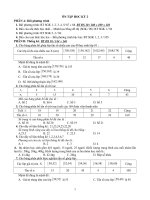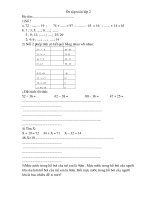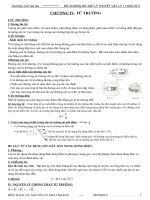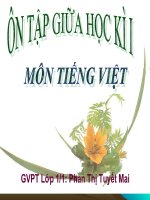Tiếng anh 12: Bài giảng ôn tập lý thuyết giữa học kỳ II
Bạn đang xem bản rút gọn của tài liệu. Xem và tải ngay bản đầy đủ của tài liệu tại đây (448.86 KB, 4 trang )
ÔN TẬP GIỮA HỌC KỲ II
MÔN: TIẾNG ANH 12 SGK CƠ BẢN
THẦY GIÁO: NGUYỄN KIM LONG - TUYENSINH247.COM
I. VOCABULARY
UNIT 9: DESERTS
Features in Deserts
1. dune /dju:n/ (n): cồn cát
2. hummock /ˈhʌm.ək/ (n): gò, đống
3. crest /krest/ (n): đỉnh (gò, đống)
4. sand /sænd/ (n): cát
5. eucalyptus /,ju:kə'liptəs/ (n): cây bạch đàn
6. cactus /ˈkæk.təs/ (n): cây xương rồng
7. spinifex /'spainəfeks/ (n): cỏ lá nhọn
8. camel /'kæməl/ (n): lạc đà
9. lizard /'lizəd/ (n): thằn lằn
10. fox /fɔks/ (n): cáo
UNIT 10: ENDANGERED SPECIES
- endanger [in'deindʒə(r)] (v): làm nguy hiểm đến
=> endangered [ in'deindʒəd] (a): bị đe dọa, bị lâm nguy
- extinct [iks'tiηk] (v): : làm tuyệt chủng
=> extinction [iks'tiηk∫n] (n): sự tuyệt chủng
- exploit [ik’splɔit] (v): khai thác
=> exploitation /ˌek.splɔɪˈteɪ.ʃən/ (n): sự khai thác
- habitat ['hæbitæt] (n): môi trường sống
- vulnerable ['vʌlnərəbl] (a): bị tổn thương
- biodiversity [baiədai'və:siti ] (n): đa dạng sinh học
- conserve [kɔn’sə:v] (v): bảo tồn
=> conservation [,kɔnsə:'vei∫n] (n): sự bảo tồn
- reserve [ri'zə:v] (v, n): dự trữ, khu bảo tồn
UNIT 11: BOOKS
Kinds of book
- textbook: sách giáo khoa
- course book: giáo trình
- reference book: sách tham khảo
1 Truy cập trang để học Toán – Lý – Hóa – Sinh – Văn – Anh – Sử
- Địa – GDCD tốt nhất!
- thriller: truyện trinh thám
- romance: truyện lãng mạn
- novel: tiểu thuyết
- science fiction book: sách về khoa học viễn tưởng
- craft book: sách dạy làm thủ công
- fiction book: sách về những câu chuyện hư cấu
- comic book: truyện tranh
- biography book: truyện kể
UNIT 12: WATER SPORTS
Water polo
- vertical post /vɜtɪkəl pəʊst/ (n): cột dọc
- crossbar /krɒs.bɑr/ (n): xà ngang
- goalie /ˈɡəʊli/ (n): người giữ gôn
- defensive player /dɪfentsɪv/ (n): hậu vệ
- referee /ref.əri/ (n): trọng tài
- penalty box /pen.əl.ti/ (n) : điểm phạt đền
- foul /faʊl/ (n): lỗi
=> major foul (n): lỗi lớn
=> minor foul (n): lỗi nhỏ
- eject /ɪdʒekt/ (v): bị đuổi
II. GRAMMAR
Unit 9: Conjunctions
Informal
but/ yet
so
- nối 2 mệnh đề trong 1 câu
- có dấu phẩy ở trước
Formal
however
therefore - nối 2 câu độc lập, đứng đầu câu, có dấu phẩy ở sau
- nối 2 mệnh đề, trước có dấu chấm phẩy
Unit 10: Modal verbs
2 Truy cập trang để học Toán – Lý – Hóa – Sinh – Văn – Anh – Sử
- Địa – GDCD tốt nhất!
- needn’t / don’t need to + V
Needn't và Don't need to được sử dụng khi “cho phép” ai đó không cần phải làm việc gì trong một tương lai
gần hoặc khi nói ai đó không nên làm việc gì.
Ex: You don’t need to/needn’t water the garden. It’s going to rain very soon.
- must / mustn’t
+ must: phải làm gì
Ex: You must study harder.
+ mustn’t: Cấm làm gì
Ex: You mustn’t pass red lights.
Unit 11: Modal verbs in passive voice
Active:
S
Passive: S
+
Modal + V
+ O
+ Modal + be + Vpp + (by O)
Active: Lan must write the letter.
Passive: The letter must be written by Lan.
Unit 12: Transitive and intransitive verbs
1/ INTRANSITIVE VERB. (nội động từ)
Intransitive verbs are those used without an object.
Ex1 :
He runs.
S
Ex2 :
He was laughing happily.
S
Ex3 :
Vi
Vi
Adv
A group of swans floated by.
S
Vi
Prep.
→ Formation : S + Vi
3 Truy cập trang để học Toán – Lý – Hóa – Sinh – Văn – Anh – Sử
- Địa – GDCD tốt nhất!
S + Vi + Adv / Prep.
2/ TRANSITIVE VERB. (ngoại động từ)
Transitive verbs are those that must have a direct object.
Ex : He was reading a newspaper.
S
Vt
Od
- Many verbs in English can be either transitive or intransitive.
Ex : I have already eaten. ( Vi )
I have eaten a cake. ( Vt)
- Transitive verbs can be divided into three types :
1/ Mono – transitive: verbs that have only one direct object.
S + Vt + Od
Ex : I enjoy pop music.
S
Vt
Od
2/ Bi - Transitive: verbs that have two objects.
S + Vt + Oi + Od
Ex : He gave me some advice.
S
Vt
Oi
Od
3/ Complex – transitive: verbs that have a direct object
and an object complement.
S + Vt + Od + C
Ex : She considered him a good friend.
S
Vt
Od
C
Note : Only transitive verbs can have the passive form, but not all transitive verbs can be changed into the
passive.
Ex : I have a car.
→ A car is had by me.
III. PRONUNCIATION: Elision
What is elision?
It’s the act of leaving out the sound of part of a word when you are pronouncing it.
Examples:
potato
/pəˈteɪtoʊ/
/pˈteɪtoʊ/
polite
/pəˈlaɪt/
/pˈlaɪt/
slept late
/slept leɪt/
/slep leɪt/
spend money
/spend ˈmʌni/
/spen ˈmʌni/
Where's he?
/wers hi/
/wers-i/
4 Truy cập trang để học Toán – Lý – Hóa – Sinh – Văn – Anh – Sử
- Địa – GDCD tốt nhất!









